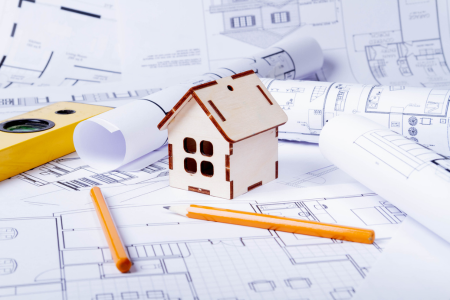Building your dream home is an exciting but daunting journey. Proper preparation makes the process as smooth as possible. Before breaking ground, consider factors that will lay the foundation for your project.
Turn your vision into reality by following five simple steps. Let us explore what to do before embarking on your home-building adventure!
1. Figure out Finances
Planning your budget lays the foundation for building your home. Research the costs of building a house, including land, contractor fees, and permits. Then, put together a realistic budget based on what you can afford.
You will likely need a construction loan to cover the project’s costs. Construction loans differ from traditional mortgages and often have higher interest rates.
Here are some tips for nailing that building budget:
- Improve your credit score: Construction mortgages require higher credit scores to secure. According to Forbes Advisor, you need a minimum credit score of 700 in Canada and 680 to qualify in America.
- Consult with a financial advisor: Banks may offer you a larger loan than you can repay. It is a good idea to discuss affordability with an advisor and stick to that amount.
- Plan for the unexpected: It is rare for a building project to stay on budget. Add 10% to 15% of total costs as padding for contingencies.
- Shop around: This includes finance providers, contractors, and materials. Do your homework to compare costs and interest rates. Getting three quotes from suppliers helps you balance budget and quality.
- Factor in hidden costs: Building a home involves expenses that can sneak up on you. Understanding expenses from window treatments to recurring property taxes will help you avoid surprises.
2. Pick the Perfect Lot
Finding the ideal location for your new home is an exciting step. The following tips can help you choose the right location:
- Research areas: Consider proximity to vital spots like work, schools, and amenities.
- Talk to realtors: Real estate professionals can advise you on land costs in your chosen areas.
- Assess land options: Create a shortlist of lots that suit your budget and vision. Investigate zoning regulations or land use restrictions.
- Evaluate the environment: Soil quality, topography and drainage can impact construction.
3. Decide on Your House Design
Now for the most thrilling part of your building journey — designing your home! Ask yourself whether you want a stock plan or a custom-designed home. A stock plan is a pre-designed, off-the-shelf home build plan. A custom plan involves working with an architect to design a unique home tailored to your needs.
An excellent place to start is deciding on your preferred home style. Do you like a decorative colonial design or a Cape Cod style?
At this step, you should decide on the must-have features for your new house, like eco-friendly materials or smart home technology.
4. Hire an Experienced Design-Build Contractor
Finding a dependable contractor might be the most important step in building a home. Your chosen team must construct a safe, high-quality house that lasts a lifetime.
You can hire individual designers and contractors or use one provider to manage the entire project. If you choose a design-build approach, you will use a single contractor who oversees design, budgeting, planning, and construction. This option offers greater control and high-quality end results. Make sure the contractor you choose has the necessary licenses to construct your home, including a general contractor’s license and insurance.
5. Get the Necessary Permits
The final step before breaking ground is obtaining permits and approvals. These tips can streamline the process:
- Understand local regulations: States or counties may have specific requirements that you should be aware of. Research building codes and zoning laws in the area.
- Apply for permits: You can apply for permits yourself or through your contractor. Contractors often have relationships with municipalities and can submit plans on your behalf. They are also familiar with building codes and regulations.
- Check HOA rules: Check that your plans meet any homeowner association guidelines if relevant.
The Final Step: Enjoy Your Dream Home
Building a new house is both thrilling and nerve-wracking. By taking the time to plan, you will be well on your way to creating the home of your dreams. Happy building!

